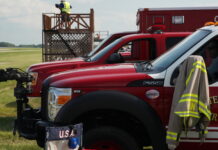If there’s a way to do it better, find it. — Thomas Edison
At its root, ICAS is an organization that facilitates the exchange of ideas. We do that almost constantly, using many different tools: our convention, this magazine, our website, Fast Facts, Ops Bull, and regional conferences, to name a few. The goal, of course, is for members to learn things through their association with ICAS that will allow them to run their air show businesses more efficiently, more profitably and more safely.
But it’s important that this exchange of ideas not be limited to members talking with other members. For ICAS, these are the easiest and most convenient conversations to prompt, but talking repeatedly amongst ourselves about the same challenges and solutions will create a very one-dimensional approach to problem solving and creativity. Individually and as an industry, we must be looking outside the air show community for the new ideas and inspiration that will fuel growth and innovation in our business.
Sometime before I joined ICAS, a keynote speaker at our convention told the convention audiences that they would likely get 80 percent of their most actionable business ideas by looking outside the air show community. The most progressive air show professionals in the United States and Canada have long recognized that they can make evolutionary progress in the development of their business by learning from their fellow ICAS members, but to make more dramatic and revolutionary progress, they need to look to other groups in other industries and disciplines.
We try and introduce these outside-of-the-box ideas within an ICAS context when we can. Several years ago, we asked representatives from Ringling Brothers, the Big Apple Circus and Cirque du Soleil to discuss their perspective on entertainment, showmanship and how to get and keep an audience’s attention. We frequently invite sponsorship experts from outside the air show community to discuss the tactics and strategies that are most effective in selling sponsorships. But the real challenge is for all of us to get outside of our comfort zone to go find new ideas and inspiration, rather than waiting passively for them to fall in our lap.
In February, I went to my first NASCAR race…the Daytona 500 in Daytona Beach, Florida. As an entertainment event, it was amazing. But as a catalyst for ideas and insight on the air show business, it was truly eye-opening. From the pomp and ceremony of the driver introductions to the VIP access given top-paying customers, there were air show lessons to be learned all day long. Air shows are not – and will never be – NASCAR. But that doesn’t mean that we can’t pay attention to and borrow some of their ideas.
I also had the opportunity to attend the annual convention of the European Airshow Council in Brussels in February. In many ways, the European air show business seems somewhat less established and structured. But the U.S. and Canada don’t have a monopoly on air show innovation and I believe that the worldwide air show community would benefit immensely from a more deliberate effort to exchange ideas more freely and frequently with our international air show colleagues.
As just one example: the Europeans don’t have and don’t want a single individual who is identified as “The Air Boss.” They manage air show safety with a Flying Control Committee comprised of experienced air show performers who are not performing that day. Is it something that North American air shows will use? Maybe. Maybe not. But there are certainly elements of their approach that would be worth investigating here in the U.S. and Canada.
Harvard Business School Professor Rosabeth Moss Kanter has written that, “Mindless habitual behavior is the enemy of innovation.” But breaking out of our normal way of doing business requires that we first accept the possibility that we could be doing better. And it further requires us to summon the energy and time to challenge the conventional wisdom on which that mindless and habitual behavior is based.
Put somewhat differently: are we ready to acknowledge that we have the capacity to be more successful and, if so, are we willing to exert the additional effort required to realize that potential?








